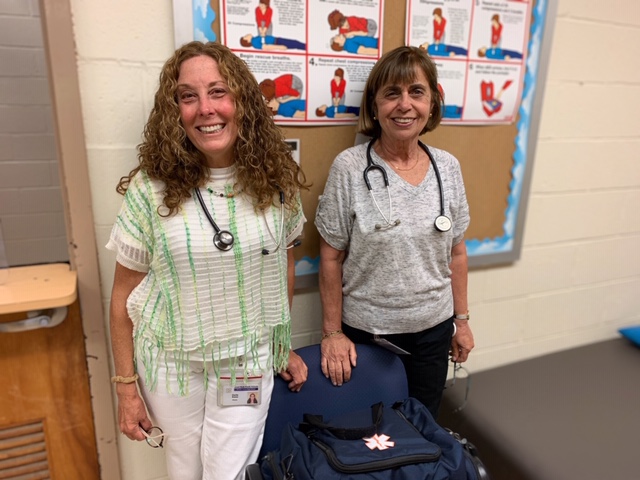Behind the Scenes of South’s Wellness
School nurses Mrs. Carla Russo (left) and Mrs. Suzanne Cutrone (right) work hard every day keeping our students and staff safe and healthy.
June 14, 2021
It’s currently 7:20 a.m. As school nurses Mrs. Suzanne Cutrone and Mrs. Carla Russo prepare for the day ahead, lines of buses start arriving at the school’s main entrance. Students pour through the doorways, then go to their first period classes. Footsteps can be heard as a few students make their way down the hallway to the nurses’ office. Soon, a line of swarming students has formed. Working papers are dropped off, doctor’s notes are received, injuries are attended to, illnesses are checked up on. This is only the start of the day.
Being a school nurse is a challenging job. With many students or staff members needing their assistance throughout the day, their responsibilities include dispensing medications, monitoring immunizations, completing physical work, taking care of chronic health conditions and food allergies, and much more. Long story short: they never know what to expect. “There are no typical things that go on in the nurse’s office. No two days are alike,” Mrs. Cutrone said.
“Everything here is atypical,” Mrs. Russo added.
With hard work comes a reward, and in general, that reward for them is having the opportunity to interact with kids more compared to working in a hospital. Mrs. Cutrone said, “I have truly enjoyed a ninth grader coming in and watching them mature to become a senior. I love the students and love taking care of them. We forge a very good relationship with the kids.”
The hours are also convenient, especially for parents.
However, with positives always comes negatives. One of the most significant negatives in being a school nurse is the salary. Compared to hospital nurses, school nurses are significantly underpaid. It’s not just an issue within our district; it’s an issue within our nation. As professionals with years of experience, school nurses can definitely be better compensated. Between the two of them, Mrs. Cutrone and Mrs. Russo have a combined 80 years of nursing experience. In addition, there are not many substitute nurses available, so it’s hard to take a day off if necessary.
And of course, the emergence of the pandemic has tremendously influenced Mrs. Cutrone and Mrs. Russo’s work. “The pandemic caused us to improvise and adapt to a whole new office really quickly. The biggest change in this past year is that we have spent a tremendous amount of time consulting and educating families over the phone instead of doing hands-on nursing,” Mrs. Cutrone said. Mrs. Cutrone and Mrs. Russo played a vital role in keeping our school open. Through all the hardships, however, they deeply relished communicating with parents more often as new relationships developed.
Although some people might believe that if they were to come into a nurse’s office injured, such as with a cut, the most the nurses would do is hand them a band-aid or ice pack, and then hurriedly dismiss them. But this is a very superficial and false misconception. “We don’t just give a band-aid. We look at it, we wash it. We make sure everything’s okay and if necessary, we call a parent,” Mrs. Cutrone stated. Ironically, Mrs. Cutrone used to also actually have this misconception in the past while she was working in urgent care. “When I would get a phone call from the school nurse, I would say, ‘they have nothing better to do?’” That was until she came into this position. “Until I took this job, I did not realize it would be the most difficult job that I’ve ever had.” Despite this misconception, Mrs. Cutrone and Mrs. Russo undeniably hold a huge role in ensuring wellness within our school community, even more so in the midst of this pandemic. While being school nurses can be tough, it is an experience Mrs. Cutrone and Mrs. Russo cherish dearly.






